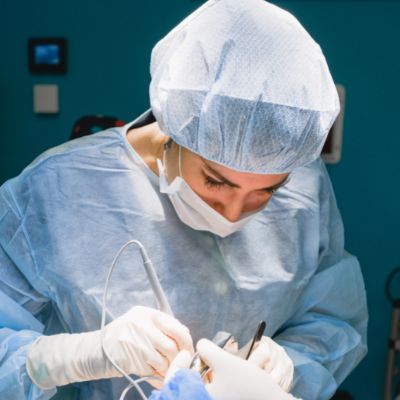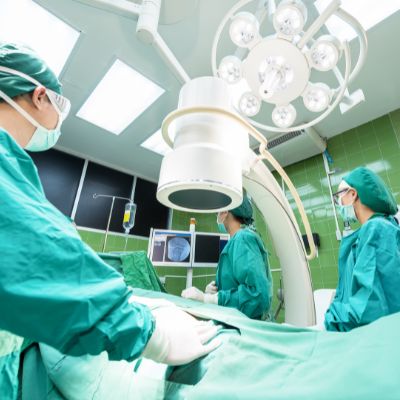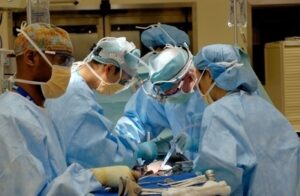The hepatobiliary system is a complex group of organs that is essential for digesting fats and removing waste from the body. It’s made up of important organs such as the liver, pancreas, and gallbladder. Unfortunately, sometimes the different parts of the system can malfunction and require surgery. We’ve compiled a list of five reasons why hepatobiliary surgery might be necessary to help you overcome your gastrointestinal issues.

They include:
- Bile duct blockages
- Liver cysts
- Bile duct injuries
- Hepatobiliary cancer
Hepatobiliary Surgery in Evansville, Indiana
At Evansville Surgical Associates, our team of surgeons is board-certified and fellowship-trained to serve Evansville, Indiana as well as the tri-state area. Some of our surgeons have even made hepatobiliary surgery a special area of interest, staying at the leading edge of the topic to provide the best surgical experience possible for their patients.
Dr. Andrea L. Jester is one of these surgeons. Along with hepatobiliary surgery, she also maintains an interest in:
- General surgery
- Colorectal surgery
- Pediatric surgery
Born and raised in Indiana, she understands the unique surgical needs of our area and seeks to provide the highest quality of care for her patients.
To meet our other surgeons, click here!
Gastrointestinal Issues and Ways That Hepatobiliary Surgery Can Help
1. Bile Duct Blockages
Also known as a bile duct obstruction, blockages in the hepatobiliary system occur within the tubes that transport bile from the liver to the small intestine and gallbladder. Bile is a liquid released by the liver that helps remove waste from your body as well as break down fats to aid in digestion.
Unfortunately, your bile ducts can become clogged which can lead to major problems throughout your body. One common problem is jaundice, a condition where your skin, the whites of your eyes, and your mucous membranes turn yellow due to the high levels of bile in your system. This can eventually lead to brain damage if left untreated.
Blockages can be treated in a number of ways. In some cases, they can be removed non-surgically during an endoscopy — a procedure that uses a special tool known as an endoscope to view the inside of your GI tract.
However, more severe cases may require the surgical removal of the gallbladder if gallstones are the cause. If cancer is the cause of the blockage then the duct may need to be widened and a tube inserted to allow drainage.
Click here to learn more about when gallbladder removal surgery may be necessary!
2. Liver Cysts
Liver cysts are sacs filled with fluid that grow on your liver. Most of them are not cancerous and never get big enough to cause symptoms. However, a small number of them can be cancerous or lead to cystic liver disease. Cystic liver disease can be caused by parasites jumping from animals to humans (hydatid disease) or by genetics (polycystic liver disease).
Your doctor won’t treat liver cysts in most cases since they are benign and too small to cause problems. On the other hand, issues such as hydatid and polycystic liver disease may require surgical treatment to avoid complications. In these cases, your surgeon may opt for cyst fenestration to remove the cyst’s wall or hepatic resection to remove the area of the liver affected by cysts.
To learn more about the reasons you may require hepatobiliary surgery, click here!
3. Bile Duct Injuries

Bile duct injuries can happen for a number of reasons. 10 – 30% are discovered during the hepatobiliary procedure itself. A much smaller percentage (around 1%) occurs as a complication of the procedure, usually because the gallbladder has been masked in some way making it difficult for the surgeon to see.
This type of masking is often the result of:
- The anatomy being different in some way
- A lot of bleeding
- Swelling
- Scarring
Common symptoms of a bile duct injury are:
- Jaundice
- Abdominal pain
- Nausea and vomiting
- Swollen abdomen
- Fever
- Chills
Treatment for an injured bile duct usually begins with managing any infections, leakage, or blockage that may be present. Next, they may have to reconstruct the bile duct so that it functions correctly again. Many injuries can be repaired if found during surgery, but complex cases may require a second procedure by a specialist to fix the issue.
4. Hepatobiliary Cancer
The liver, gallbladder, and pancreas can all be affected by cancer. In these cases, the best course of action may be the removal (resection) of the primary and secondary (metastatic) tumors in your hepatobiliary system. However, sometimes a transplant may be necessary similar to treating portal hypertension.
Common forms of hepatobiliary cancer include:
- Liver cancer
- Gallbladder cancer
- Bile duct carcinoma
Your surgeon will be able to identify which form of hepatobiliary cancer you have developed and the best course of action or removing it.
Are you in need of hepatobiliary surgery in Evansville, Indiana? Call us at (812) 424-8231 or (800) 264-8231 to schedule your appointment!
Hepatobiliary surgery can help with gastrointestinal issues in a number of ways. Blockages can be removed with endoscopy or surgery. Liver replacement provides the only effective treatment for portal hypertension. While not usually harmful, liver cysts may require surgery for removal. Injuries to the bile duct can happen for various reasons, including during surgery. With hepatobiliary cancer, surgery may be necessary to remove the cancer and restore your health.
Evansville Surgical Associates has been providing comprehensive and compassionate surgical care for over 50 years. Call us at (812) 424-8231 or (800) 264-8231. We are available from 8:00 am to 4:30 pm if you would like to schedule an appointment.



